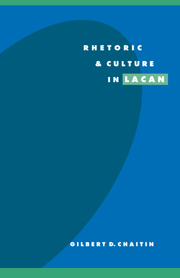Book contents
- Frontmatter
- Contents
- Acknowledgements
- 1 Introduction
- 2 Treeing Lacan, or the Meaning of Metaphor
- 3 A Being of Significance
- 4 From Logic to Ethics: Transference and the Letter
- 5 Desire and Culture: Transference and the Other
- 6 The Subject and the Symbolic Order: Historicity, Mathematics, Poetry
- 7 Conclusion: Lacan and Contemporary Criticism
- Bibliography
- Index
5 - Desire and Culture: Transference and the Other
Published online by Cambridge University Press: 04 September 2009
- Frontmatter
- Contents
- Acknowledgements
- 1 Introduction
- 2 Treeing Lacan, or the Meaning of Metaphor
- 3 A Being of Significance
- 4 From Logic to Ethics: Transference and the Letter
- 5 Desire and Culture: Transference and the Other
- 6 The Subject and the Symbolic Order: Historicity, Mathematics, Poetry
- 7 Conclusion: Lacan and Contemporary Criticism
- Bibliography
- Index
Summary
L'amour est une métaphore.
Lacan, Le transfert[L'objet] fait de nous autre chose que le sujet de la parole, mais ce quelque chose d'unique, d'inappréciable, d'irremplaçable en fin de compte, qui est le véritable point où nous pouvons désigner ce que j'ai appelé la dignité du sujet.
Lacan, Le transfertFreud states that the onset of transference in the psychoanalytic process – the formation of erotic and aggressive relations of the analysand to the analyst – regularly begins with a moment of silence, when associations are lacking and the subject stares out the window or at the carpet while forming unconscious thoughts about the analyst. Transference thus first appears as a resistance to the analytic process, an interruption in the flow of free associations without which there can be no analysis. It would seem that a precise description of the situation would avoid imputing the positive existence of unconscious thoughts to the subject at the time when the only observable phenomenon is the gap in her narration. He nevertheless infers that such a stoppage in the stream of associations does in fact betray transferential thoughts, for experience shows that when the subject has been informed that she is thinking of the analyst, her associations invariably resume.
This inference leaves Freud with the problem of explaining why transference, whose effective establishment is the sine qua non of the psychoanalytic process, should emerge in the form of resistance, that is, as the most powerful hindrance to that very process.
- Type
- Chapter
- Information
- Rhetoric and Culture in Lacan , pp. 150 - 194Publisher: Cambridge University PressPrint publication year: 1996



